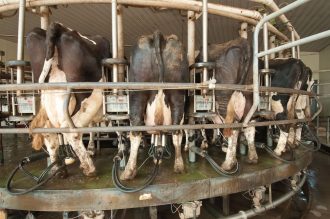Kashrut and Animal Production: Rabbi David Rosen

The following interview was conducted by JES with Rabbi David Rosen, the American Jewish Committee’s International Director of Interreligious Affairs. He served as Chief Rabbi of Ireland and as the senior rabbi of the largest Orthodox Jewish congregation in South Africa. He is also a prominent vegan activist and an Honorary President of the International Jewish Vegetarian and Ecology society.
How can we renew kashrut in our time? What is kashrut meant to develop in us?
The biblical command to lead a special lifestyle that today we call kashrut, is one of the few injunctions in the Torah, in the Hebrew bible, where a reason is given for it. We are told that by leading this lifestyle we are leading a holy lifestyle. Holiness. What is holiness? Holiness is above all G-d consciousness, that we don’t take things for granted, that we appreciate the gifts that G-d has given to us. And in order to be consistent with that spirit of awareness of the Divine, we have to ensure that not only do we not take things for granted, but that we behave in a manner that is morally consistent with that goal. Our Sages say that the mitzvoth, the commandments, were only given in order to refine the human spirit. And they say it specifically with regards to the laws of kashrut, specifically with regards to how animals are prepared for consumption.

Industrialized dairy production.
The laws of kashrut, of keeping a kosher lifestyle, are among the few in the Torah where a specific goal is expressed. It is the goal of holiness of G-d consciousness, of appreciation of G-d’s gifts. In order to be able to live in consonant with that ideal we have to be sure that every aspect of our conduct is ethically in keeping with Jewish values and teachings. Our Sages say, in the Talmud, that the commandments were only given to refine the human person, to refine the human spirit, and they say it specifically with regards to keeping kashrut. Now, if today animal products are produced in a manner that desecrates fundamental ethical teachings in Judaism with regards to compassion for animals, the care for our environment, not to waste and to desecrate the prohibition of Bal Taschit, then simply because the process at the end of the chain has been in accordance with Jewish requirements as to how to slaughter and prepare the meat, but you have ignored all those obligations beforehand, raises a significant question as to whether you can truly call such products “kosher”, because kashrut must impact upon our whole sense of our relationship to the gifts and the cosmos that G-d has granted us and which we have been gifted to live. And, therefore, it requires a question of greater spiritual sensitivity; kashrut should lead us to be more noble.

The Sages teach us that a Jewish quality that defines an authentic Jew is compassion. If you are not compassionate they say then something is not Jewish about you, even to the point of questioning your own antecedents. In other words, compassion is such a defining quality that it must animate all aspects of Jewish behavior. Where more so than in the commandment that is specifically designed to make us holy? And if that holiness, and that way of life, is actually desecrating compassion in the very process itself then it’s desecrating its ultimate goal and ultimate purpose.
Is the kosher meat industry desecrating the Jewish value of Lifnei Iver?
In addition to our own responsibilities to lead a personal lifestyle that is consonant with Jewish teachings on compassion and care for animal life, today there are issues about our own place in the commercial market of products that desecrate these values. The vast majority of products on the market that come from an animal source involve outright desecration of Jewish teachings, of Jewish teachings on compassion and care for sentient beings and our environment. Therefore, if we purchase such products, we are ourselves complicit in aiding and abetting an industry that is desecrating Jewish principles and teachings. Thus asides from our own responsibilities to ourselves, we have responsibilities not to encourage others to be party to such desecration. This is the Jewish teaching “you shall not put a stumbling block in front of the blind”. Judaism understands that to mean that you shall not do anything to aid and abet desecration of Jewish principle and teaching. And if we, therefore, allow and encourage the purchase of dairy products or of eggs, let alone of animal produce that is the result of the desecration of teachings, we ourselves are complicit in this process.

It seems to me that it is scandalous to put a stamp of kosher legitimacy on a product that is the result of desecrating such fundamental Jewish teaching. Kosher must not just be the end product, but it must be the result of how a whole process has been conducted; if the process involves the desecration of Jewish teaching then you could say that it is, technically, maybe in accordance with certain Jewish requirements for the process of how to slaughter an animal and how to process its products. But it surely cannot be said to be truly kosher in terms of the processes that led up to that production. Therefore, today people should be careful not to rely simply upon a stamp of kosher approval. They should try to avoid anything that involves the desecration of Jewish principles, of teachings, with regard to compassion and concern for animal life.
Why does the Torah allow us to eat meat?
The Torah allows for the consumption of animal products and surely there were times and places in the course of history where human beings could not get all their necessary nutrients without a certain amount of animal protein. But then again the conditions under which that animal protein was obtained were totally different from that which the vast majority is provided on the market today. Nevertheless it is clear that, for the Torah, the ideal is not a meat consumptive lifestyle. This is to be seen already in the Garden of Eden where the ideal society is a vegan society and even to many of our commentators, early commentators, in the vision of the messianic age as articulated by the prophet Isaiah where the wolf and the lion are living with the lamb and the goat and the fatling. So you have this vision of an ideal society.
The language that the Torah uses, as was pointed out particularly by Rav Kook, on the value and ideal of not being party to meat consumption, uses the language of concession. The word “Ta’avat nafshecha” is used and is translated into English as “lust”. “If your hearts lust to eat meat” then this is the way to do it. Lust is not a positive concept, but there is a recognition in the Torah that human beings have certain needs and human beings are fallible creatures and therefore their weaknesses have to be accommodated.
Let me give another illustration: the Torah legislates for divorce. Divorce is not an ideal. Divorce is a recognition that it doesn’t always work out well for people to be able to get on, better they should go their separate ways than live in an unhappy relationship. So meat eating is also part of that concessionary response of the Torah to certain human needs at certain times and places. But that has to be consistent with all aspects of Jewish teaching. Today it’s not even possible to be consistent with Jewish teaching. But whether meat eating is a concession or a legitimate activity, that, I have to confess, is a matter of debate within the Jewish community. I can’t be certain that a person will accept my argument that a vegan lifestyle is the one that the Torah sees as the ideal. But for me it’s very clear that that’s what the Torah mandates.

What about the catching and killing of farmed fish?
It’s clear that the Torah has a hierarchy, if you like, of life in which the human person is not the same as an animal and an animal is not the same as foul and foul is not the same as fish. Yet nevertheless a fish is still a sentient being and therefore the responsibilities to behave in a compassionate manner apply to fish as well as to foul and animals. Today, the conditions under which fish are reared within fish ponds and under various other conditions, are quite cruel themselves. In addition to the maltreatment of fish, there is also the pollution caused within these pools. Methane gas also comes out of it and the droppings, the effluent, is therefore concentrated within those particular pools. In addition, in seas there is trawling that destroys the environmental context and content, and therefore does a lot of damage to the natural ecosystem within the sea. And, therefore, the means by which fisheries are operated today whether, if you like, within a natural oceanic context or in artificial fish pools to prepare for human needs, in that regard, also desecrates Jewish teaching with regard to compassion and concern for sentient beings.
Additional Interview Links:
